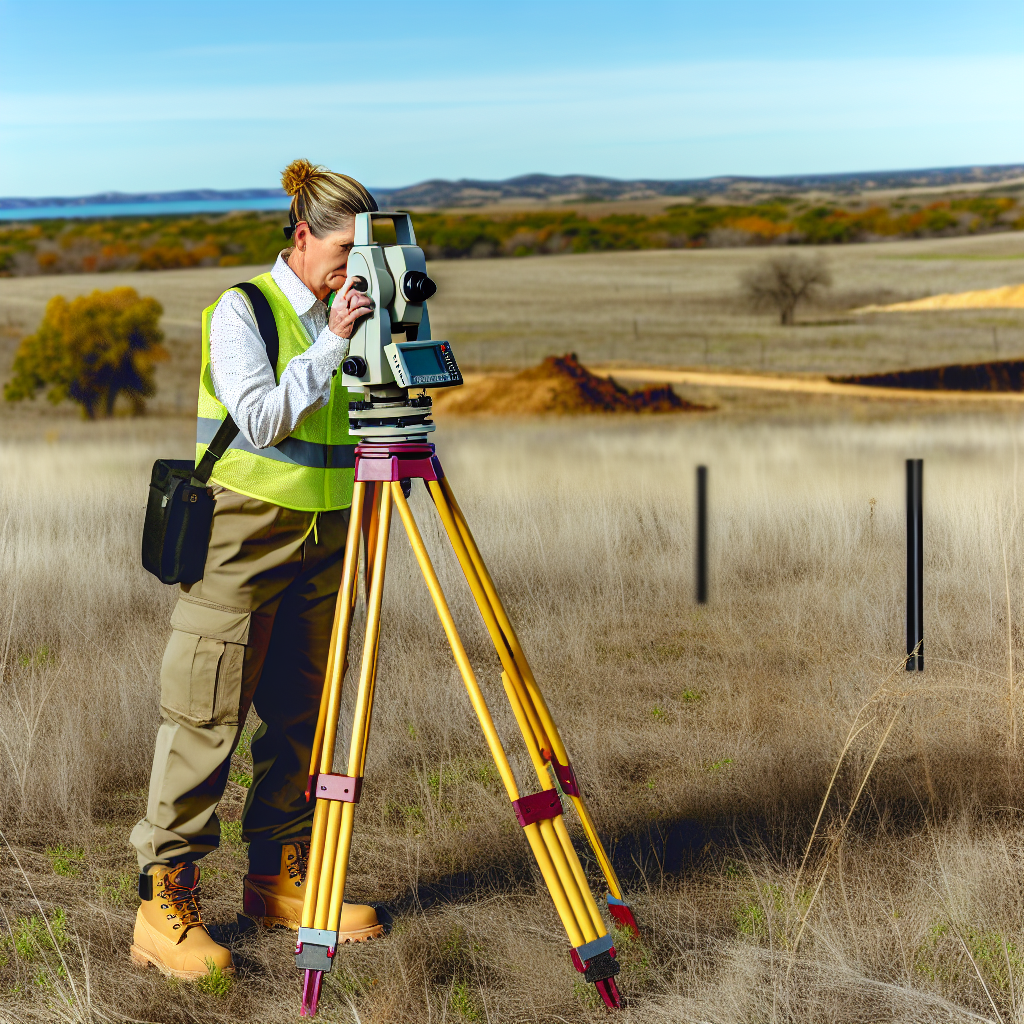Introduction:
In the field of surveying, possessing essential skills is crucial for success.
These key competencies are the foundation of a surveyor’s ability to deliver accurate and reliable results.
Technical Skills:
Having strong technical skills is crucial for success in surveying.
Surveyors rely on technical knowledge and tools to accurately measure and map land.
- Knowledge of GPS Systems: One of the most important technical skills for surveyors is the ability to use GPS systems for precise measurements and data collection.
- CAD Software: Surveyors also need to be proficient in Computer-Aided Design (CAD) software to create detailed maps and plans.
- Analysis Tools: Understanding and utilizing analysis tools to interpret collected data is essential for making informed decisions.
- Data Management: Surveyors must be skilled in managing and processing massive amounts of data collected during surveys.
Examples of technical skills required:
Surveyors need to have in-depth knowledge of various technical skills to excel in their field.
Examples of such skills include:
- Ability to operate Total Stations for accurate distance and angle measurements.
- Proficiency in using Geographic Information Systems (GIS) software for mapping and analyzing spatial data.
- Understanding of surveying instruments like levels, theodolites, and drones to collect precise measurements.
Ways to improve technical skills:
Surveyors can enhance their technical skills through continuous learning and gaining hands-on experience in the field.
Some ways to improve technical skills include:
- Participating in workshops and seminars to stay updated on the latest technological advancements in surveying.
- Enrolling in courses or certifications that focus on specific technical skills such as GPS usage or CAD software.
- Seeking mentorship from experienced surveyors to learn practical techniques and best practices in using technical tools.
- Engaging in real-world surveying projects to apply technical skills in a practical setting and gain valuable experience.
By continuously honing their technical skills, surveyors can stay competitive in the industry and deliver high-quality results to clients.
Attention to Detail
Attention to detail is essential for accurate surveying.
Every measurement must be precise to ensure the validity and reliability of the data collected.
- Double-checking measurements is crucial to catch any errors or inconsistencies that could impact the accuracy of the survey results.
- It is important to review and verify all measurements before finalizing any survey data to avoid costly mistakes or inaccuracies.
- Attention to detail is not only about measuring accurately but also about documenting and recording data accurately for future reference.
Tips for improving attention to detail in surveying tasks include:
- Use high-quality surveying equipment to ensure precision and accuracy in measurements.
- Take your time to carefully measure and record data to minimize errors and inaccuracies.
- Work in a distraction-free environment to focus fully on the task at hand and avoid overlooking crucial details.
- Double-check all measurements and calculations before finalizing any survey data to guarantee its accuracy.
- Consult with team members or colleagues to review survey data and ensure that all measurements are correct and consistent.
By paying close attention to detail and following these tips, surveyors can improve the accuracy and reliability of their tasks.
Ultimately, this leads to better decision-making and outcomes based on the collected data.
Find Out More: How to Achieve a Professional Finish with Spray Paint
Communication Skills:
Effective communication is crucial when dealing with clients, team members, and stakeholders.
To communicate clearly in written reports, use simple language and organize information logically.
In verbal presentations, speak confidently, maintain eye contact, and use visuals to enhance understanding.
Develop good interpersonal skills by actively listening, being empathetic, and building rapport with others.
Discover More: How to Choose the Right Fence for Your Property
Transform Your Career Today
Unlock a personalized career strategy that drives real results. Get tailored advice and a roadmap designed just for you.
Start NowProblem-Solving Abilities:
Surveyors play a crucial role in various industries by collecting data, analyzing information, and making recommendations based on their findings.
In order to excel in this field, it is essential for surveyors to possess strong problem-solving abilities.
Being able to think critically allows surveyors to evaluate different perspectives, identify potential issues, and determine the most effective solutions.
Surveying often involves dealing with intricate data sets, technical equipment, and challenging terrain, making problem-solving skills a valuable asset in this profession.
Common Challenges Surveyors Face and How to Overcome Them
One common challenge that surveyors may encounter is inaccurate or incomplete data.
This can lead to errors in measurement, resulting in inaccurate survey results.
To overcome this challenge, surveyors should double-check their data, cross-reference information from multiple sources, and communicate effectively with colleagues to ensure the accuracy of their measurements.
Another challenge is adverse weather conditions, which can hinder surveying activities and impact the quality of data collected.
To address this issue, surveyors can plan ahead, monitor weather forecasts, and implement safety protocols to minimize disruptions caused by inclement weather.
Strategies for Developing Problem-Solving Skills
One effective way for surveyors to enhance their problem-solving abilities is through practice and experience.
By engaging in hands-on projects, collaborating with senior surveyors, and seeking mentorship opportunities, surveyors can gain valuable insights and refine their problem-solving techniques.
Additionally, participating in workshops, training programs, and professional development courses can help surveyors expand their knowledge base and stay updated on the latest technological advancements in the field.
By continuously challenging themselves and seeking new opportunities for growth, surveyors can improve their problem-solving skills and excel in their careers.
Explore Further: Top 10 Cities for Welders in the USA: Where to Work?
Time Management:
Effective time management is essential in surveying due to the nature of the work.
Surveyors often have multiple projects with tight deadlines, requiring efficient allocation of time to meet client expectations and deliver high-quality results.
Tips for prioritizing tasks and meeting deadlines without sacrificing quality
-
Prioritize tasks: Start by identifying urgent and important tasks that need immediate attention.
-
Set realistic deadlines: Be realistic about the time needed to complete each task and avoid overcommitting.
-
Delegate when possible: If you have a team, delegate tasks based on individual strengths and expertise.
-
Avoid multitasking: Focus on one task at a time to ensure quality work and prevent mistakes.
-
Use time tracking tools: Utilize software or apps to track time spent on each task.
Tools and techniques for improving time management skills in surveying work
-
Project management software: Invest in software tools that help in planning, tracking, and managing survey projects.
-
Gantt charts: Use Gantt charts to visualize project timelines and dependencies.
-
Time blocking: Allocate specific blocks of time for different tasks to maintain focus and prevent distractions.
-
Regular breaks: Take short breaks between tasks to recharge and maintain productivity.
-
Continuous learning: Stay updated on the latest technologies and techniques in surveying to optimize workflows.
Uncover the Details: Building Codes and Standards: Carpenter’s Compliance Guide

Adaptability is a crucial skill for surveyors due to the ever-changing nature of the industry.
Surveying projects often encounter unexpected challenges, such as changes in scope or unforeseen obstacles.
Surveyors must be able to quickly adjust their plans and methodologies to overcome these hurdles and ensure project success.
Transform Your Career Today
Unlock a personalized career strategy that drives real results. Get tailored advice and a roadmap designed just for you.
Start NowContinuously educating oneself on the latest industry trends and technological advancements is key to improving adaptability.
Attending seminars, workshops, and conferences can help surveyors stay informed about new tools and techniques that can streamline their work processes.
Building a strong network of industry professionals can provide valuable insights and support when facing unexpected challenges.
Developing contingency plans beforehand can help surveyors react quickly to unforeseen changes without causing delays in the project timeline.
Embracing a growth mindset and viewing challenges as opportunities for learning and improvement can help surveyors adapt more effectively in dynamic environments.
Adaptability is a fundamental skill for surveyors to navigate the complexities of the industry and overcome obstacles with resilience and innovation.
Legal and Ethical Understanding
Understanding laws and regulations in surveying is crucial for compliance.
Surveyors must adhere to ethical standards and professional codes of conduct.
Staying informed about legal and ethical issues is essential for success.
Surveying is a field that is heavily regulated by laws and regulations to ensure accuracy, fairness, and accountability in the profession.
It is important for surveyors to have a deep understanding of these laws and regulations to avoid legal pitfalls and ensure compliance with industry standards.
Surveyors must ensure that they follow ethical standards and professional codes of conduct in their practice.
This includes maintaining integrity, honesty, and transparency in their work, as well as protecting the confidentiality of client information.
By adhering to these ethical standards, surveyors can build trust with clients and stakeholders.
There are several tips that surveyors can follow to ensure compliance with legal and ethical standards.
One tip is to regularly review and update their knowledge of laws and regulations in surveying.
Surveyors should also seek guidance from legal experts or professional organizations if they are unsure about the legality of certain practices.
Surveyors can also stay informed about legal and ethical issues in the field by subscribing to industry publications, attending conferences and seminars, and participating in continuing education programs.
By staying up-to-date on current issues and best practices, surveyors can mitigate risks and protect their professional reputation.
In addition, surveyors can utilize resources such as online forums and professional networks to discuss legal and ethical challenges with their peers.
Transform Your Career Today
Unlock a personalized career strategy that drives real results. Get tailored advice and a roadmap designed just for you.
Start NowBy engaging in open dialogue and sharing experiences, surveyors can learn from each other and improve their understanding of legal and ethical issues in surveying.
Importance of Legal and Ethical Standards
Legal and ethical understanding is a critical competency for surveyors to succeed in their practice.
By adhering to laws, regulations, and ethical standards, surveyors can build trust with clients, protect their professional reputation, and ensure the integrity of their work.
Key Competencies for Surveyors
As a successful surveyor, it is crucial to possess key competencies such as attention to detail, technical skills, communication abilities, and problem-solving capabilities.
These traits are essential for navigating the complexities of surveying projects efficiently and effectively.
Continuous learning and improvement are vital in honing these competencies.
Embracing new technologies, staying updated on industry trends, and seeking professional development opportunities can further enhance surveyors’ skills and expertise.
For aspiring surveyors, focusing on developing these competencies is crucial for a prosperous career in the field.
By committing to lifelong learning and growth, individuals can position themselves for success in the ever-evolving field of surveying.
Additional Resources
4 Child Development and Early Learning | Transforming the …
5 Essential Civil Engineering Skills You Need – Ohio University
[E-Books for Sale]
The Big Book of 500 High-Paying Jobs in America: Unlock Your Earning Potential
$19.99 • 500 High-Paying Jobs • 330 pages
Explore 500 high-paying jobs in America and learn how to boost your career, earn more, and achieve success!
See All 500 High-Paying Jobs of this E-Book
1001 Professions Without a Degree: High-Paying American Jobs You Can Start Now
$19.99 • 1001 Professions Without a Degree • 174 pages
Discover 1001 high-paying jobs without a degree! Unlock career tips, skills, and success strategies for just $19.99!




